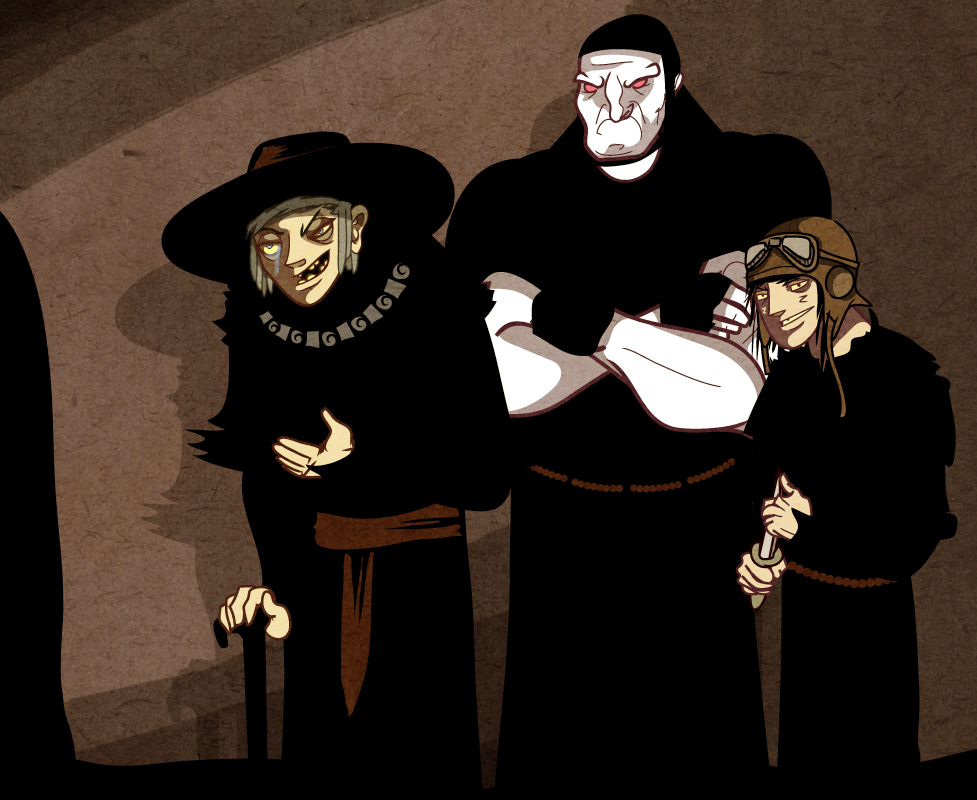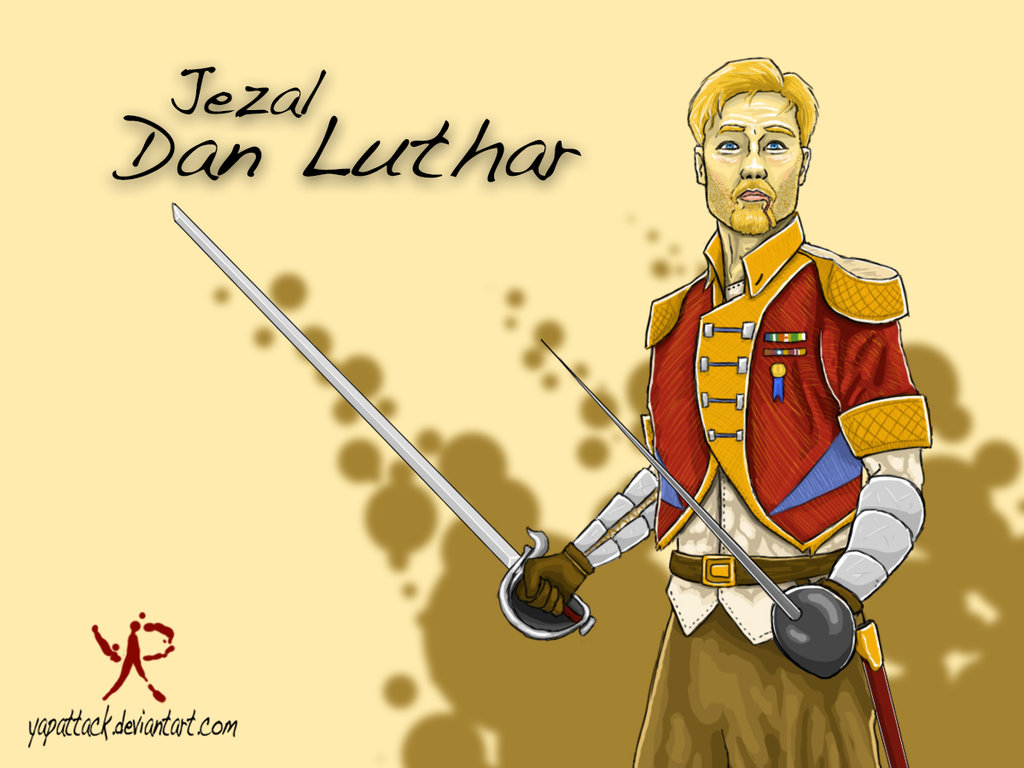
 |
| Logen Nine Fingers, Found on Cuded.com |
Characters: the characters in the Blade Itself are excellently drawn. The Barbarian, Logen Nine Fingers is constantly surprising us with his sensitivity, intelligence and laconic wit. Each narrator in the book has one or two modus operandi phrases, a technique used very effectively by Abercrombie to create very distinct individuals. In Logen's case, the lines are "I'm still alive!" And "you have to be realistic about these things." The first is shouted at the top of his lung, or muttered quietly after every violent encounter, not in some balls to the wall defiant war cry, but an honest to goodness, joi de vivre. Unusual and greatly endearing for a barbarian known throughout the land in bloody song and story. The second phrase is muttered frequently in resigned acceptance of the most horrendous if fates, whether he's dangling from a cliff or running from twenty armed men.
Inquisitor Exempt Sand den Glokta is a beautifully written character. And a fantastically original one. How many ex-playboy, swordsman, dandies, tortured for six years and turned crippled at
 |
| Inquisitor Glokta by Sirheartsalot Deviant Art |
And then there is Jezal. A nobleman of the worst variety, a young man training for the Contest, a yearly fencing event that eager gentlemen throughout the Union engage in because winning brings fame and place within Union society. Hating Jezal is a given, even at the novels' end after (SPOILER: ) falling in love with a commoner, he still thinks the common soldier is beneath his notice. Still this classicism is so British that it adds a marvelous layer of reality to the novel. While kings and peasants are the bread and butter of fantasy, it is a rare novel that doesn't use some sort of diamond in the rough trope allowing the commoner to advance within society without facing the scorn of his betters. We like Jezal too, though it is unclear, aside from playing Mr. Darcy, what role he has in the action packed saga about to unfold.
Cliche: First there is The Barbarian. Logen is a man of the north. A common cliche in fantasy, most popularly used in Game of Thrones, as the peoples who live beyond the wall. Savage, scarred, filthy, wearing skins and uneducated. Think the Goths and the Visigoths and you won't be far off. Conan the Barbarian as envisioned by Howard is also probably the seminal work of Barbarian fiction. Steven Erikson, as I've linked to before, has a neat essay on the concept of the Barbarian in fantasy.

Next there is the Old Wizard cliche: represented by the First of the Magi Bayaz. While Bayaz has no long grey beard or pointy hat, he does have the arrogance and the long lifespan of those who practice the art. Of course, Abercrombie puts his own twist to the cliche. Bayaz looks like a blacksmith and so far, no lightning bolts or fireballs. I won't spoil the magic for you, but it's there, and it's tastefully done. There is something off-putting about Bayaz. Something vaguely distasteful, almost disingenuous about Bayaz. Like he doesn't believe his own platitudes.
Another new cliche for us is the First Law cliche. There is often something tongue and cheek about the First Law cliche, perhaps because speaking directly to the reader requires a deft touch, else it sound ham fisted and trite. It is a set of laws or principles which govern the system of magic, or other secretive or cliquish gathering. Here the First law is that it is forbidden to touch the Other Side or speak with devils. The first law doesn't have much significance in this volume, though the second does, "it is forbidden to eat the flesh of humans." Other fine examples of the First Law cliche exist in the Wheel of Time, both in the repeated catechism against the Shadow, or in the rules for embracing the Source. It's a cliche, that done well, adds a sense of realism to the world, after all we do live in a world of laws and too often fantasy novels dispense with such mundanities.
The Middlemarche cliche. I've already mentioned it a bit, in my reference to Austen's Pride & Prejudice (the Pride and Prejudice Cliche just doesn't work as well) the use of very classic forms of British class structure to inform the world. it's important to note that Abercrombie is British and as such has an implicit advantage over his Canadian and American contemporaries. In general I believe Erikson to be the leader of modern fantasy, but in this small aspect Erikson falls behind. Abercrombie's Jezal is so spot on detailing English snobbery it hurts.
The Evil Empire cliche and Migrating Other cliche: one thing I rather like about the First Law books and The Blade itself is that it has already painted two or three epic baddies who have nothing to do with the book's actual plot. This frees up the narrator to focus on the here and now while still allowing the book to expand into a series. I always hated the Wizard's First Law Books because the first two seemed like stand alone novels and the epic that emerged was appended to the first story with scotch tape. Not so here, we already have a variety of enemies and none of them are really central to any of the main characters. The Evil Empire cliche is often steeped in Orientalism, a West versus East, narrative. And while this is another racist element of fantasy as a genre, it remains, even today a pretty effective one: China and the Middle East remain bogeymen to most people and are great political fodder for applying motivational fear. In the Blade Itself we learn relatively little about the Empire. It is vast, it has a magical cadre of sorcerers known as Eaters, and it has a new, young emperor looking to earn his chops.
Then there is the King Beyond the Wall, a Mance Rayder type of baddy who is a Northman sweeping down to ravage the soft middle countries of the Union. This cliche is somewhat tired given the current popularity of Game of Thrones.
| a Shanka, by rynomyte at Zbrushcentral |
Last, there is a new cliche: the Migrating Other. History is a patina of competing movements of men, tribes coming north or south in droves and driving the current inhabitants further inland. The Migrating Other is the bad guy, even though he in turn flees another bad guy displacing him. In fantasy however, the Migrating Other can frequently be a race of non men, orcs or in this case the Flat Tops. Sanderson uses the Migrating Other cliche in the Way of Kings to describe the enemy with which the Kingdom is trapped in aimless and endless war. The cliche by itself, though realistic enough, is generally not enough for fantasy. But, overpopulation, displacement, and finding food and resources simply does not provide the clear moral imperative that fantasy so often requires. So when used it's usually used in tandem with other cliches or as Abercrombie explains in the final pages (SPOILER) it is a race created by magic to serve as an army of destruction.
Completeness:Abercrombie has created a fully believable world with genuine, detailed characters. He also excels at the honourable mention: that writing technique in which a few lines of detailed text provides volumes of exposition. His listing of court lords and ladies is an excellent example of this. Though the Court has almost a non existent presence in the book, it still feels replete with characters that are differentiated, complete and ready to be picked up and exploited should the author need them. There's nothing more amateur hour then having a character added at the end to provide necessary information to end the story. Also quite compelling its the idea of the Old Empire. A great civilization destroyed by a war between magi, that has spent the following centuries in perpetual strife.
 |
| The fall of Manetheran, gorgeous, not sure whose image |
The world feels completely fleshed out, easily a dozen nations are described or mentioned, though only three are relevant. Politics and trade seems real and even modern. As a fantasist with an interest in economics I was thrilled to see some discussion within the text of the economic relationships between provinces, the financing of the war with the Empire, a union bashing autocrat, and even discussion of crown and union debts.
Another delightful detail was in the small physical ticks the characters have: for example Logen Nine Fingers trims his blisters next to the fire, Marshal Burr has a weak stomach that causes him to burp unfortunately. These are the sort of details that really make a story sing.
But to top it all off. And I saw a reviewer (Mark Monday) on Goodreads mention this, the book is a truly funny read. It's dark humor, true enough, but the book is laugh out loud funny! Even my wife commented on my laughing while reading!
So, please give Abercrombie another chance, and my hats off to this new bright star in the realms of fantasy.



No comments:
Post a Comment